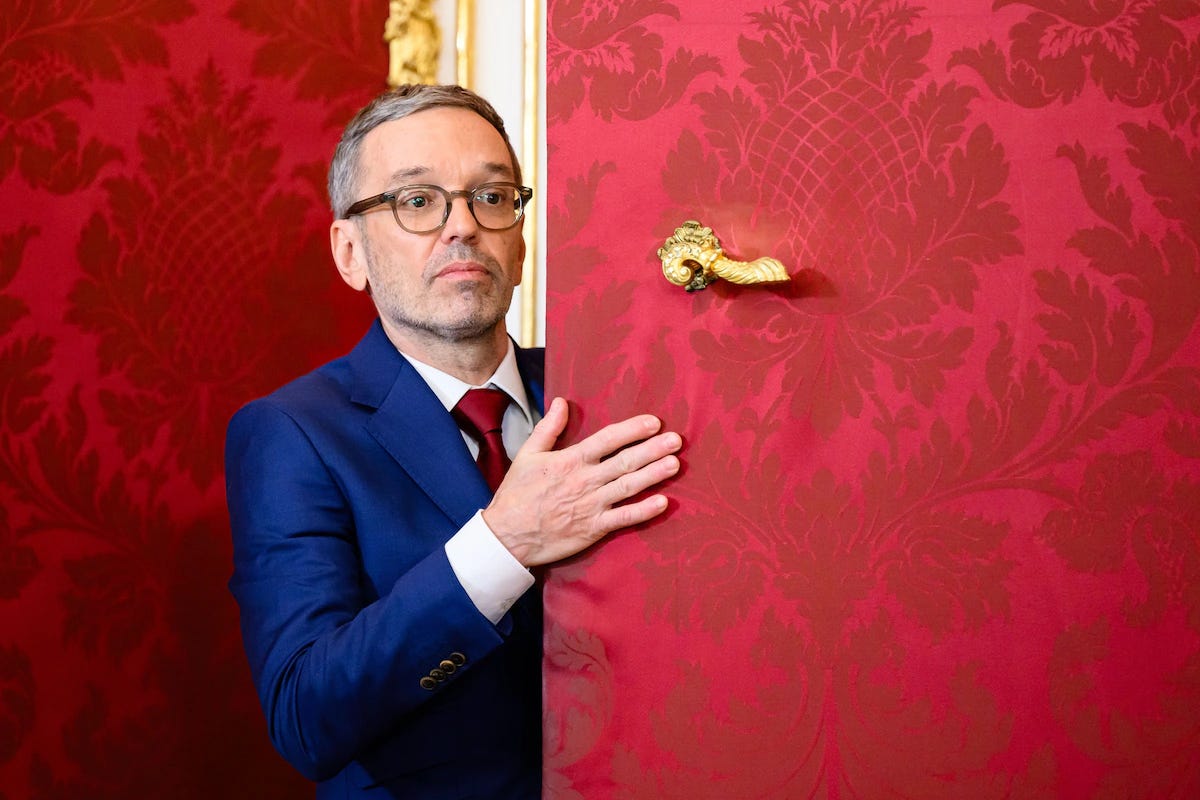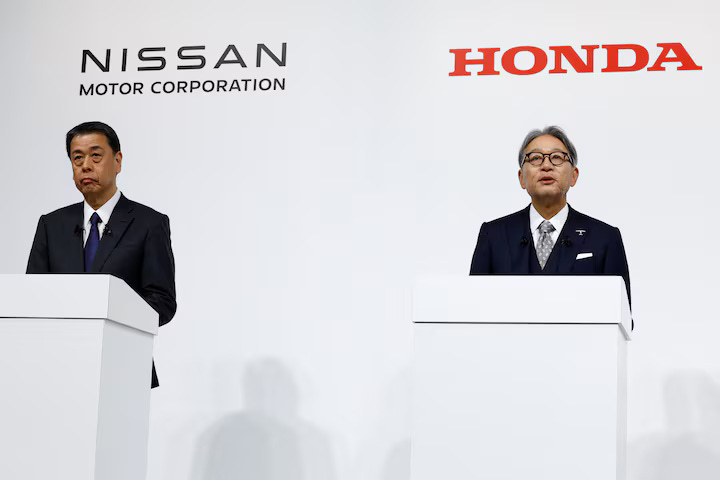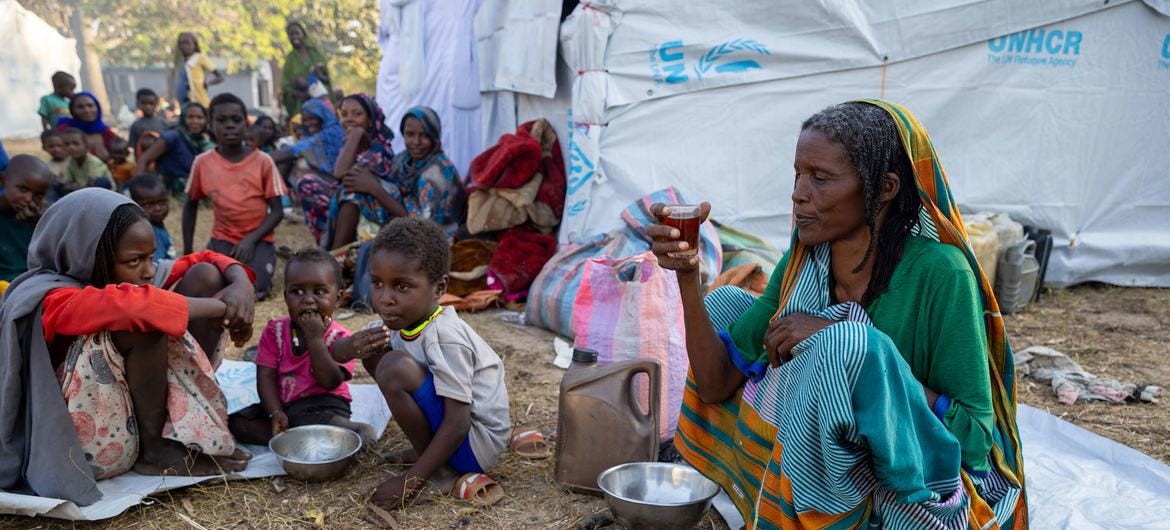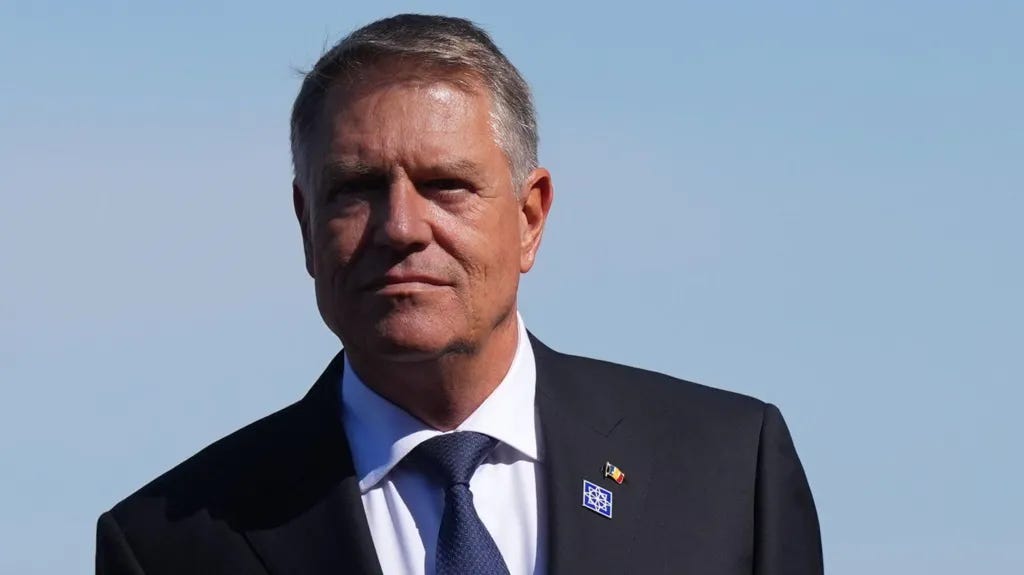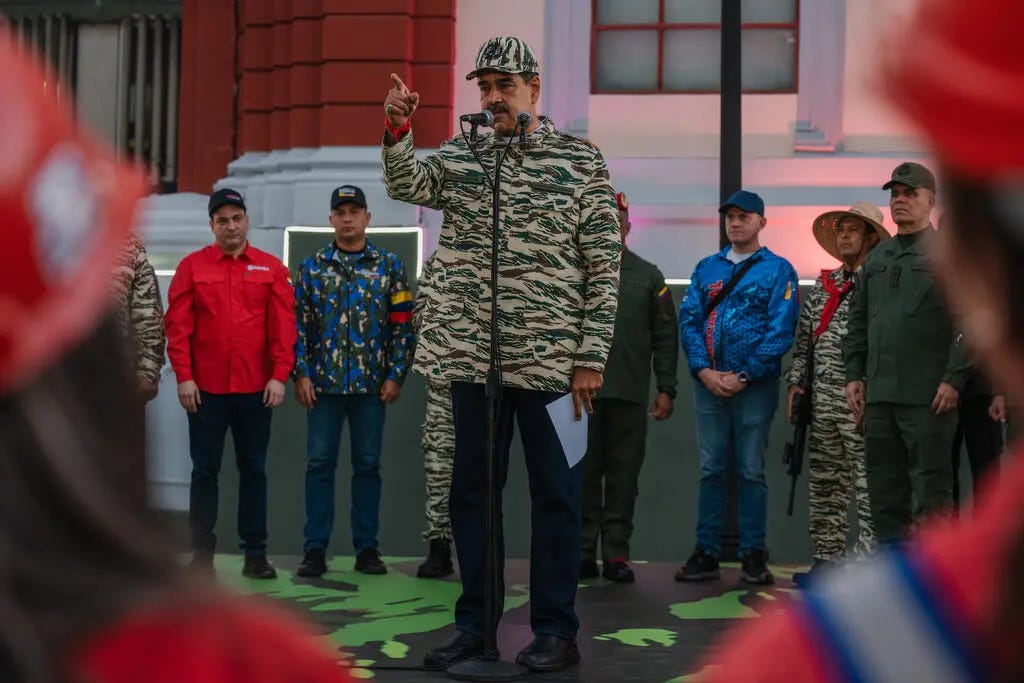Key Themes: Democratic Erosion, Political Instability, Global Economic Shifts, Foreign Influence and Humanitarian Crises
1️⃣ ‘Austria’s far right eyes chancellor’s office despite failed coalition talks’ - https://www.washingtonpost.com/world/2025/02/15/austria-freedom-party-kickl/
Austria continues to struggle to form a government following its September elections, as parties remain unable to agree on a coalition. Herbert Kickl and his Freedom Party (FPÖ) secured first place with 28.8% of the vote—the first victory for a far-right party in Austria since the end of World War II. Since then, Kickl has attempted to position himself as the Volkskanzler, a term most prominently used by Hitler, and to lead the Austrian government as chancellor.
Coalition talks have collapsed for a second time, reinforcing divisions within the nation while demonstrating the strength far-right parties currently wield. Kickl sought to form a government with the center-right Austrian People’s Party (ÖVP) but ultimately broke off negotiations over his insistence on controlling the Interior Ministry. Reportedly, some ground has already been ceded to the FPÖ, particularly regarding its goals of tightening immigration policies and restricting asylum and migration.
Federal President Alexander Van der Bellen has long been grappling with the political crisis and the future direction of his nation. He has repeatedly denounced a Kickl-led government and is unlikely to shift from this stance. Kickl, however, claims that if the FPÖ is forced out of governance, the resulting minority government will be weak and short-lived, ultimately triggering a new election cycle. Such a scenario would likely favor the FPÖ, as its support continues to grow.
Far-right parties are no strangers to governance across Europe, yet they are often blocked from reaching the highest levels of power. Parliamentary systems require compromise, and it is practically unheard of for mainstream parties to form coalitions with the far-right on leadership matters. Many minority groups in Austria fear the worst. Jewish organizations have condemned Kickl’s Holocaust revisionism, while immigrants worry about their future in the country.
The FPÖ has called for stricter border controls, Austria’s withdrawal from the EU and UN institutions, and reforms to gender laws. Kickl has echoed Trumpian rhetoric, with the influence of the U.S. president seeping into Western political discourse. Statements like “We, the Freedom Party, are the representatives of the middle, of common sense, of normality, and the only ones who say what others don’t dare to say” are coded appeals to those who share his ideology—though not particularly subtle ones.
Van der Bellen has so far been stymied in his efforts to counter the FPÖ’s rise. New elections risk further gains for the party, yet a weak minority government could all but guarantee its continued ascent. What is the best course of action to minimize the FPÖ’s power and influence in Austrian politics?
2️⃣ ‘How Nissan and Honda's $60 billion merger talks collapsed’ - https://www.reuters.com/markets/deals/inside-collapse-nissan-hondas-60-billion-mega-deal-2025-02-12/
Japan and its markets are adjusting after the collapse of a proposed merger between two of the world's largest automotive companies, Nissan and Honda. Both automakers have faced declining sales, with weaker-than-expected performance in the U.S. market and increased competition from Chinese car manufacturers flooding Japan.
The merger had already encountered obstacles in its early discussions, but ultimately, Honda’s demands—combined with Nissan’s insistence on maintaining its independence—proved insurmountable. Nissan sought to be recognized as an equal partner to Honda despite its weaker financial position. Meanwhile, Honda aimed to reduce Nissan's spending on workforce and factories, a condition Nissan refused to accept. While Nissan has avoided concerns about becoming a subsidiary, its financial woes remain unresolved and have only worsened due to factors such as U.S. tariffs on Mexican-made automobiles.
Both Nissan and Honda rely on Mexican factories for over a quarter of their American sales, and both companies' CEOs have stated that they will release updated financial reports later this month. In November, Nissan forecasted a 70% drop in profits and subsequently cut 9,000 jobs. CEO Makoto Uchida also announced he would halve his salary to focus on more efficient spending.
The merger was announced in December but was quickly derailed due to shareholder disagreements. Honda representatives viewed Nissan’s approach as too slow, while Nissan representatives criticized Honda’s strategy as lacking clarity and detail. From the outset, the relationship was not one of mutual partnership; rather, Honda appeared to dominate the discussions.
In January, Nissan visited Kyushu and proposed building an EV factory on the island, a project expected to create 500 jobs. However, just a day later, Honda announced its intention to make Nissan a subsidiary rather than an equal partner. This move effectively ended negotiations, with Nissan feeling blindsided and deeply disrespected. After the fallout, Nissan began seeking alternative partnerships.
One such potential partner is Foxconn, the Taiwanese contract manufacturer, which has expressed interest in exploring a collaboration. This deal could be mutually beneficial—Nissan would bring brand recognition, while Foxconn would provide much-needed capital. The Japanese government has yet to comment on the failed merger or the possibility of a Taiwanese company partnering with one of Japan’s most iconic automotive brands.
Regarding Nissan and their decision: Did they miss out on a strong deal with a fellow Japanese automaker, or was it necessary to stand firm in preserving their corporate sovereignty, even at the risk of further financial struggles?
3️⃣ ‘Sudan, ‘the most devastating humanitarian and displacement crisis in the world’’ - https://news.un.org/en/story/2025/02/1160161
Sudan and its population face grave danger as the civil war approaches its third year, with the UN designating $4.2 billion in aid. The UN has described the situation as the world's greatest humanitarian calamity, stressing the urgent need for mass assistance.
Sudan was long ruled by Omar al-Bashir following his 1993 military coup, but he was ousted in 2022 by the Sudanese Armed Forces (SAF) and the Rapid Support Forces (RSF). These militant factions initially united to remove al-Bashir, with the UN supporting a peace process aimed at establishing a new civilian government. However, Sudanese hopes for civilian rule were short-lived, as the nation descended into conflict almost immediately. The RSF and SAF clashed following an April 2023 RSF-led attack on the capital, Khartoum, triggering widespread violence, particularly in the South and Southwest.
The UN was forced to flee Khartoum, and both the UN and the African Union (AU) condemned the violence while warning neighboring countries of its spillover effects. The conflict has been especially brutal for civilians, with over two-thirds of Sudan’s population now in need of assistance. More than 30 million people face famine, disease, and a severe lack of medical aid, while millions have been displaced. Humanitarian efforts have reached 15.6 million people, but ongoing security threats make continued relief work increasingly difficult.
Despite the dangers, UN workers and humanitarian organizations persist, risking their lives to provide aid. The Food and Agriculture Organization, the World Health Organization, and UNICEF are among the many groups struggling to support Sudanese civilians. Over 9 million people have been displaced within Sudan, while nearly 3.5 million have fled abroad. Egypt and South Sudan each host more than 1 million refugees, but neighboring countries, many of which have their own humanitarian crises, are struggling to absorb the influx. The displaced population, regardless of where they have sought refuge, continues to suffer from food insecurity and a lack of essential services.
Since 2023, nearly 19,000 people have been killed, with the death toll rising daily. Women and young girls are especially vulnerable, facing widespread sexual violence, forced marriages, and mass abductions. Young men are at high risk of forced conscription into militant groups. Billions of dollars in aid are required, yet funding has only become scarcer. With over 21 million people at extreme risk, the crisis remains without a clear solution.
What is the most effective route that the UN or other international organizations can take not only to broker peace but to ensure lasting stability? What structures must be built to create guardrails against future disasters like this?
4️⃣ ‘Romania president resigns after impeachment pressure over cancelled vote’ - https://www.bbc.com/news/articles/c3w805xjg1xo
Romania faces further political uncertainty as its president resigns amid the fallout of a contentious 2024 election. President Klaus Iohannis, with an impeachment vote looming, had previously postponed presidential elections until May 2025, citing Russian meddling and national security concerns. However, critics condemned his actions as undemocratic.
Iohannis, a centrist and pro-EU leader, has governed Romania since 2014, serving two terms. The Romanian courts halted the scheduled December vote, and with no clear successor, Iohannis remained in office despite the country’s constitutional five-year term limit, arguing that stability was paramount. Opposition candidates and lawmakers denounced the move as unconstitutional, sparking mass protests, with tens of thousands of Romanians taking to the streets. Facing mounting pressure from all sectors of society, Iohannis ultimately stepped down, insisting that his actions were meant to spare the country from crisis.
Iohannis asserted that Romania's Western and EU allies understood the need for stability, given the nation’s strategic importance as the largest Easternmost member of both the EU and NATO. Romania has long been a target of Russian electoral interference, and recent polling indicated growing support for far-right candidate Călin Georgescu, a pro-Russian, NATO-skeptic figure. Romanian foreign intelligence agencies have linked his surge in popularity to external influence.
Georgescu won the first round of voting in December, with right-wing parties performing far better than expected. With elections now rescheduled for May, he remains the frontrunner. Liberal candidate Elena Lasconi has welcomed Iohannis’s resignation, while the past months of political turmoil have further damaged Iohannis’s party’s standing in the polls.
While Georgescu is currently in a strong position, his victory is not guaranteed. What events or scenarios could shake up Romanian politics, influencing voter preferences and altering the expected outcome?
5️⃣ ‘Maduro Government Accused of Dark New Tactic: Assassinations’ - https://www.nytimes.com/2025/02/10/world/americas/venezuela-maduro-murder-chile.html
Venezuela and its government face further scrutiny as new details emerge regarding the murder of Ronald Ojeda. Ojeda, a former Venezuelan Army officer, fled to Chile seeking asylum after attempting to plot against Venezuelan President Nicolás Maduro. He was abducted from his home in front of his family, with his wife asserting that the perpetrators spoke with a Venezuelan accent. His body was later found buried under concrete, and Chilean authorities have confirmed that the Maduro government was responsible—an allegation that Maduro has denied.
Maduro has long maintained an iron grip on Venezuela, where political discrimination and imprisonment are commonplace. However, revelations of an assassination plot against an exiled dissident would mark a stark escalation. Venezuelan dissidents and critics worldwide have long feared this possibility, with Ojeda’s murder serving as a grim turning point, reinforcing the need for anonymity and heightened security among opposition figures.
Carolina Tohá, Chile’s interior and public security minister, announced that multiple suspects have confessed to being hired by the Venezuelan government. Of the three main hypotheses for Ojeda’s murder—gang violence, extortion, and political persecution—Chilean authorities have ruled out the first two, leaving political motives as the likely cause. Venezuela’s government has repeatedly denied all accusations, with its attorney general dismissing the operation as a false-flag setup orchestrated by Chile. Meanwhile, Chilean investigators have reported Venezuelan interference in the case.
The accusations against Venezuela surfaced shortly after the United States, under President Trump, pressured Maduro to accept the return of Venezuelan migrants from America. Since withdrawing its diplomats from Venezuela in 2019, the U.S. has refused to recognize Maduro as the country’s legitimate leader. Maduro’s government has a documented history of human rights abuses and harsh crackdowns on dissidents, making the latest allegations unsurprising yet deeply concerning.
Following Ojeda’s murder and the ensuing accusations, Chile has severed diplomatic ties with Venezuela. With mounting international pressure, how will Maduro’s government respond? Will he seek to de-escalate tensions by conceding to some demands from neighboring countries, or will he double down, seeking further support from allies like Russia while consolidating his grip on power?
Photo Credits:
Herbert Kickl, chairman of the Freedom Party, leaves a meeting with Austrian President Alexander Van der Bellen on Jan. 6. [Max Slovencik, EPA-EFE/Shutterstock]
Makoto Uchida, Director, Representative Executive Officer, President and CEO of Nissan Motor Corporation and Toshihiro Mibe, Director, President and Representative Executive Officer of Honda, hold a joint press conference on their merger talks, in Tokyo, Japan, December 23, 2024. [Kim Kyung-Hoon, REUTERS]
Central African Republic, 2024. Newly arrived Sudanese refugees at Korsi refugee camp. [Karel Prinsloo, UNFPA]
Two-term President Klaus Iohannis played a role in the controversial cancellation of Romania's presidential election. [PA Media, BBC]
President Nicolás Maduro last month during a ceremony to swear in new members of a national militia. [NYT, The New York Times]




